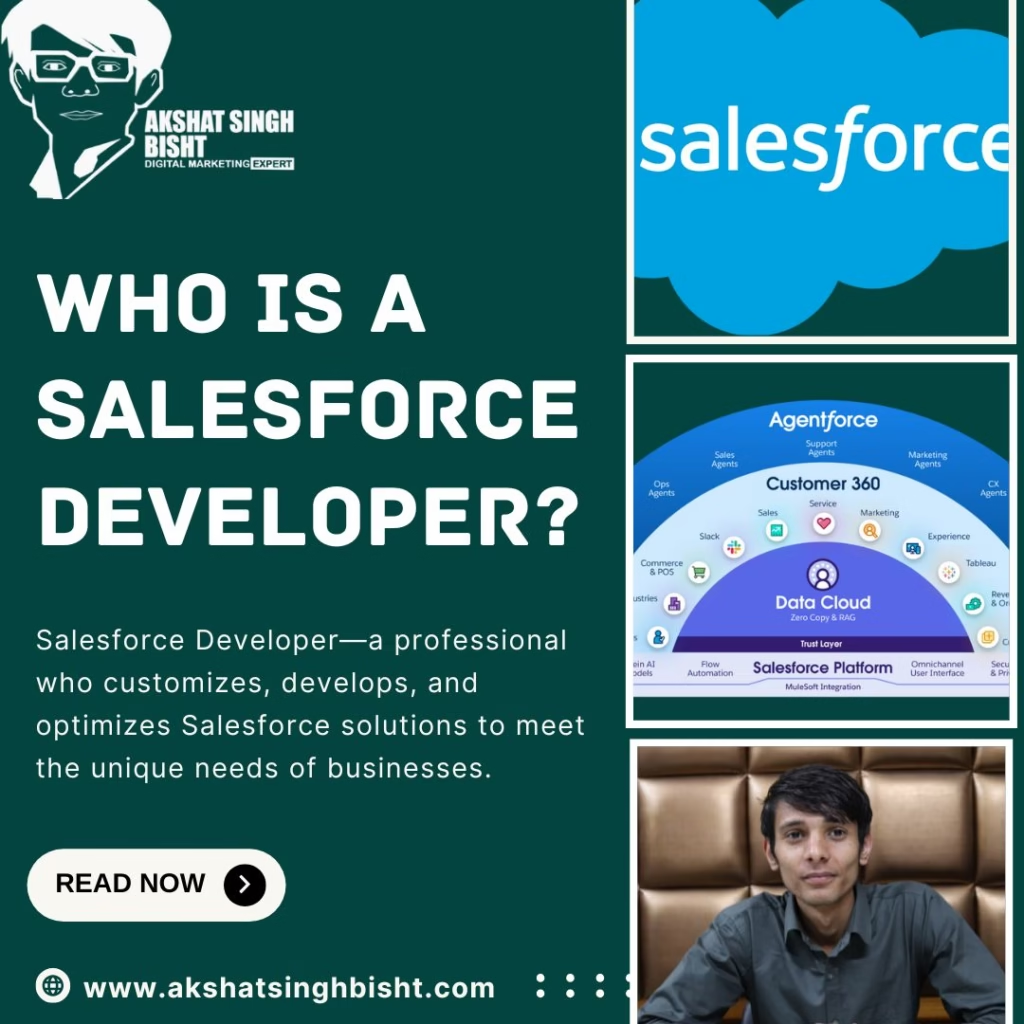In today’s digital-first business world, Customer Relationship Management (CRM) systems play a vital role in enhancing organizational efficiency, boosting sales, and improving customer satisfaction. Salesforce, one of the leading CRM platforms, is widely used by businesses of all sizes to manage customer data, streamline processes, and drive growth. At the heart of this powerful platform is the Salesforce Developer—a professional who customizes, develops, and optimizes Salesforce solutions to meet the unique needs of businesses.
So, what does it mean to be a Salesforce Developer? Let’s dive into the key responsibilities, skills, and career prospects in this specialized role.

A Salesforce Developer is responsible for creating and maintaining applications and features within the Salesforce ecosystem. They primarily work with Apex (Salesforce’s proprietary programming language) and Visualforce (for creating custom user interfaces) to build and optimize the Salesforce environment. Their main duties include:
Customization: Salesforce is a highly customizable platform, and developers tailor it to an organization’s specific needs. This includes modifying objects, fields, workflows, and page layouts, among other elements.
Integration: Salesforce Developers often work on integrating Salesforce with third-party applications, external databases, or legacy systems to ensure smooth data flow across platforms.
Automation: Developers create automated workflows, triggers, and processes using Salesforce tools like Flow, Process Builder, and Apex to reduce manual tasks and enhance productivity.
Development: Using Apex, developers write custom business logic to implement complex operations that are not supported by standard Salesforce features. Visualforce and Lightning Components are used to design custom user interfaces that enhance the user experience.
Maintenance: Salesforce Developers are also tasked with ensuring the smooth operation of the system, which includes troubleshooting issues, performing regular updates, and optimizing the platform’s performance.
Testing: Ensuring the reliability of Salesforce applications through rigorous testing is an essential part of a Salesforce Developer’s job. This can involve unit tests, system tests, and performance tuning.
Collaboration: Salesforce Developers often work closely with Salesforce Administrators, Business Analysts, and Project Managers to ensure that the platform is configured to meet both business requirements and technical standards.
Being a Salesforce Developer requires a mix of technical expertise, problem-solving ability, and knowledge of the Salesforce ecosystem. Some key skills include:
Apex Programming: Apex is Salesforce’s proprietary programming language. Mastery of Apex allows developers to write custom logic that extends Salesforce’s core functionality.
Visualforce and Lightning Components: Visualforce is used to design custom pages, while Lightning Components are a more modern way to build dynamic, responsive user interfaces for Salesforce.
Salesforce Data Modeling: A strong understanding of Salesforce’s data model—objects, fields, and relationships—is essential to ensure effective data management.
APIs and Integration: Understanding how to integrate Salesforce with external systems using REST and SOAP APIs is critical for ensuring that data flows seamlessly between different platforms.
Problem-Solving and Debugging: Salesforce Developers must be able to diagnose issues, optimize code, and find effective solutions to complex business problems.
Salesforce Tools: Familiarity with tools like Salesforce Developer Console, Workbench, and Visual Studio Code (with Salesforce extensions) is important for streamlining the development process.
Knowledge of Salesforce Products: Familiarity with various Salesforce products (Sales Cloud, Service Cloud, Marketing Cloud, etc.) enables developers to create solutions that leverage the full potential of the platform.
Version Control: As part of a team, Salesforce Developers often use tools like Git to manage and track changes in code.
Testing and Deployment: Understanding the best practices for testing Apex code, as well as deployment methodologies (like using Salesforce DX or changesets), is essential to delivering high-quality solutions.
To become a Salesforce Developer, individuals generally follow these steps:
Learn Salesforce Fundamentals: Start by gaining a solid understanding of Salesforce’s core concepts, such as objects, fields, workflows, and reports. Free resources like Salesforce’s Trailhead platform can be a great starting point.
Master Apex Programming: Learning Apex and the Salesforce development environment is a key part of the journey. Salesforce provides documentation and tutorials to help developers get started.
Get Certified: Salesforce offers various certifications that validate expertise in specific areas. For aspiring developers, the “Salesforce Platform Developer I” certification is the most common entry point.
Hands-On Experience: It’s essential to gain practical experience by working on real-world Salesforce projects. Many developers start by contributing to community projects, freelancing, or working with smaller companies before progressing to larger enterprises.
Stay Updated: Salesforce is constantly evolving, with new features and tools being released regularly. It’s important to stay current with updates through forums, blogs, webinars, and continuing education via Trailhead.
Salesforce Developers are in high demand, as more and more businesses are adopting Salesforce to drive their customer relationship management efforts. The role offers significant career growth and competitive salaries. According to industry reports, the average salary for a Salesforce Developer in the United States is between $90,000 and $140,000 annually, depending on experience and location. Additionally, Salesforce developers can expect job security, given the widespread use of Salesforce across industries.
As businesses increasingly rely on automation, cloud computing, and CRM solutions, the demand for Salesforce Developers is expected to grow steadily. This makes it an excellent career choice for those interested in technology and business solutions.
A Salesforce Developer plays a critical role in helping businesses get the most out of their Salesforce CRM system. By customizing and extending the platform, they ensure that organizations can manage customer relationships more effectively, automate workflows, and ultimately drive business growth. Whether you’re a developer looking to specialize in Salesforce or a business considering implementing Salesforce, the role of a Salesforce Developer is crucial to achieving long-term success.
Akshat’s passion for marketing and dedication to helping others has been the driving force behind AkshatSinghBisht.com. Known for his insightful perspectives, practical advice, and unwavering commitment to his audience, Akshat is a trusted voice in the marketing community.
If you have any questions simply use the following contact details.